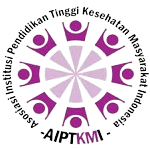Hubungan Karakteristik, Riwayat Penyakit, dan Obesitas dengan Keluhan Carpal Tunnel Syndrom (CTS) Pada Komunitas Ojek Online Wilayah Kecamatan Ciracas Jakarta Timur Tahun 2022
Abstract
Keywords: characteristics, medical history, obesity, Carpal Tunnel Syndrome (CTS) complaints, Online Motorcycle Taxi
Keywords
Full Text:
PDFReferences
Agustin, A. (2017). Persepsi Masyarakat Terhadap Penggunaan Transportasi Online (GO-JEK) Di Surabaya. Jurnal Ilmu Dan Riset Manajemen, 6(1), 1–
https://doi.org/10.31842/jurnal-inobis.v2i1.60
Ali, MK & Sathiyasekaran, B. (2006). Computer Professionals And Carpal Tunnel Syndrome (CTS). International Journal Of Safety And Ergonomie (JOSE), Vol.12, No.
Amalia. (2019). Faktor Risiko Yang Mempengaruhi Carpal Tunnel Syndrome Pada Buruh Perempuan Gudang Tembakau Kecamatan Ajung Kabupaten Jember. Journal Of Agromedicine And Medical Sciences, 5 Nomor 2, 101–105.
Bahrudin, M. (2011). Carpal Tunnel Syndrome (CTS). 7(14), 151–154. https://doi.org/10.1002/9781119968375.ch19
Colle, A., Asfian, P., & Andisiri, W. (2016). Faktor-Faktor Yang Berhubungan Dengan Perilaku Safety Riding Pada Siswa Sma Negeri 1 Wundulako Kabupaten Kolaka Tahun 2016. Jurnal Ilmiah Mahasiswa Kesehatan Masyarakat Unsyiah, 1(3), 185037.
Darno. (2011). Hubungan Karakteristik Pekerjaan Dan Gerakan Berulang Dengan Kejadian Carpal Tunnel Syndrome Pada Pemetik Daun Teh. Universitas Sebelas Maret.
Depkes RI. (2011). Pedoman Praktis Memantau Status Gizi Orang Dewasa. Duncan, S. F. M., & Kakinoki, R. (2017). Carpal Tunnel Syndrome and Related Median Neuropathies: Challenges and Complications. In Carpal Tunnel Syndrome and Related Median Neuropathies: Challenges and Complications. https://doi.org/10.1007/978-3-319-57010-5
Fanny S. Farhan, A. A. K. (2018). Faktor-faktor yang Mempengaruhi Timbulnya Carpal Tunnel Syndrome pada Pengendara Ojek. Jurnal Manajemen Kesehatan Yayasan RS. Dr. Soetomo, Vol. 4 No., 123–133.
Faust, K., & Jennings, C. D. (2016). Carpal Tunnel Syndrome.
Genova, A., Dix, O., Saefan, A., Thakur, M., & Hassan, A. (2020). Carpal Tunnel Syndrome: A Review of Literature. 12(3), 316–320. https://doi.org/10.7759/cureus.7333
Harahap, R. (2003). Carpal Tunnel Syndrome. Cermin Dunia Kedokteran.
Hartanti, HF; Asnifatima, A., & Fatimah, A. (2018). faktor risiko yang berhubungan dengan keluhan carpal tunnel syndrome pada pekerja operator komputer bagian redaksi di Harian Metropolitan Bogor tahun 2018. PROMOTOR Jurnal Mahasiswa Kesehatan Masyarakat, Vol. 1 No.
Hastono, S. (2012). Analisis Data. Fakultas Kesehatan Masyarakat Universitas Indonesia.
Jagga, V., Lehri, A., & Verma, S. K. (2011). Occupation and its Association with Carpal Tunnel Syndrome - A Review. Journal of Exercise Science and Physiotherapy, 7(2), 68. https://doi.org/10.18376//2011/v7i2/67610
Kemenkes RI. (2015). Petunjuk Teknis Pemeriksaan Deteksi Dini Faktor Risiko Kecelakaan Lalu Lintas bagi Pengemudi.
Kinanti, Y. (2019). Analisis Faktor Risiko Gejala Carpal Tunnel Syndrome Pada Pengendara Ojek Daring Di Shelter Stasiun Depok Baru Tahun 2019. In (Skripsi). Universitas Pembangunan Nasional “Veteran” Jakarta.
Kurniawan, B., Jayanti, S., & Setyaningsih, Y. (2008). Faktor Risiko Kejadian Carpal Tunnel Syndrome (CTS) pada Wanita Pemetik Melati di Desa Karangcengis, Purbalingga. Jurnal Promosi Kesehatan Indonesia, 3(1), 31– 37. https://doi.org/10.14710/jpki.3.1.31-37
Lazuardi, A. I., Ma, I., & Hartanti, R. I. (2016). Determinan Gejala Carpal Tunnel Syndrome ( CTS ) pada Pekerja Pemecah Batu ( Studi pada Pekerja Pemecah Batu di Kecamatan Sumbersari dan Sukowono Kabupaten Jember ) Determinants of Carpal Tunnel Syndrome ( CTS ) Symptoms on Rock- Breaking Workers ( Study o.
Leblanc, K. E., & Cestia, W. (2011). Carpal tunnel syndrome. American Family Physician, 83(8), 952–958. https://doi.org/10.1016/j.yhls.2011.04.073
Levy et all. (2011). Occupational and Enviromental Health Recognizing and Preventing Disease and Injury (Sixth Edit). Oxford University Press.
Notoatmodjo, S. (2015). Metodologi Penelitian Kesehatan. Penerbit Rineka Cipta.
Salawati, L., & Syahrul. (2014). Carpal Tunel Syndrome. Jurnal Kedokteran Syiah Kuala, 14(1), 29–37.
Sastroasmoro. (2014). Dasar-Dasar Metodologi Penelitian Klinis Edisi ke-5 (Edisi 5). CV. Sagung Seto.
Selviyati, V. ; A. C. ; E. S. (2016). Analisis Determinan Kejadian Carpal Tunnel Syndrome (CTS) pada Petani Penyadap Pohon Karet di Desa Karang Manik Kecamatan Belitang II Kabupaten OKU Timur. Jurnal Ilmu Kesehatan Masyarakat, Vol. 7 No., 198–208.
Sitompul, Y. R. B. (2019). Risiko Jenis Pekerjaan dengan Kejadian Carpal Tunnel Syndrome (CTS). Jurnal Ilmiah WIDYA, Volume 5 N.
Suherman. (2012). Beberapa Faktor Kerja Yang Berhubungan Dengan Kejadian Carpal Tunnel Syndrome (CTS) Pada Petugas rental Komputer Di Kelurahan Kahuripan Kota Tasikmalaya. Universitas Siliwangi.
Suma’mur. (2007). Keselamatan Kerja dan Pencegahan Kecelakaan. CV. Haji Masagung.
Tarwaka. (2012). Keselamatan dan Kesehatan Kerja, Manajemen dan Implementasi Kesehatan dan Keselamatan Kerja di Tempat Kerja. Harapan Press.
Tsilidi, D., Pachoulakis, I., & Analyti, A. (2018). Carpal Tunnel Syndrome: Causes, Prevention, Rehabilitation and Computer-Aided, Game-Based Physiotherapy. Advances in Image and Video Processing, 6(2). https://doi.org/10.14738/aivp.62.4459
Tumuwe, R., Damis, M., & Mulianti, T. (2018). Pengguna ojek online di kalangan mahasiswa Universitas Sam Ratulangi Manado. Jurnal Holistik, 21, 1–19.
Wardana. (2018). Faktor-Faktor Yang Berhubungan Dengan Kejadian Carpal Tunnel Syndrome (CTS) Pada Pekerja Unit Assembling Pt X Kota Semarang Tahun 2018. Jurnal Kesehatan Masyarakat (E-Journal), Volume 6,.
Wipperman, J., & Goerl, K. (2016). Carpal tunnel syndrome: Diagnosis and management. American Family Physician, 94(12), 993–999. https://doi.org/10.5435/okoj-12-11-3
Zhang, D., Chruscielski, C. M., Blazar, P., & Earp, B. E. (2020). Accuracy of Provocative Tests for Carpal Tunnel Syndrome. Journal of Hand Surgery Global Online, 2(3), 121–125. https://doi.org/10.1016/j.jhsg.2020
DOI: https://doi.org/10.52643/jukmas.v7i2.3209
Refbacks
- There are currently no refbacks.
Copyright (c) 2023 Jurnal Untuk Masyarakat Sehat (JUKMAS)

This work is licensed under a Creative Commons Attribution-ShareAlike 4.0 International License.

.pdf_2.png)












